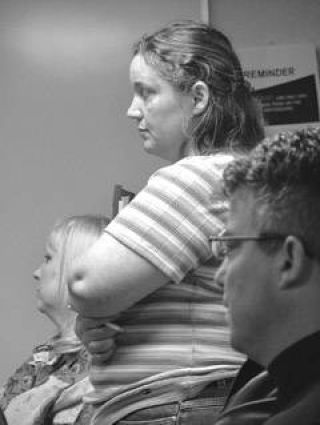By Teresa Herriman, The Courier-Herald
Parents and students converged at a May 26 meeting of the Sumner School Board to voice their concerns about the high school senior project.
The board listened for nearly two hours as parents and students outlined their complaints about the mandatory project.
Most of the issues centered on tying the successful completion of the project to being allowed to participate in June graduation ceremonies.
"The punishment doesn't fit the crime," Bambi Hiron claimed. Her son, Jordan Martin, failed his senior project and will not be walking with his class. Jordan is the school's Associated Student Body president.
Others complained of inattentive advisers, inconsistent application of the rules and lack of communication between the school and parents.
"The process is the problem," Martin said, when he addressed the board.
Although the senior project is not new - this is the 11th year Sumner High School has required it - more students are failing than in previous years, sending the slew of angry parents to address the school board.
According to a school report, of the 462 portfolios turned in on time, 30 did not pass muster and were sent to the May boards, where they were re-evaluated. In a typical year 10 to 12 students fail the project, said District Communications Director Ann Cook.
"(This year) seems to be an anomaly," she said.
The senior project is designed as a culminating endeavor to measure the student's skills. All students are required to participate, explained school board members .
Antoni Froehling, board member and legislative representative, said while he's served on the board, it has supported the project.
"In fact, my support has grown stronger," he said.
School board member Greg Hanon agreed.
"It's such a good requirement, the state has accepted it," he said.
Beginning in 2008, all schools in Washington will require students to complete a final, cumulative project to graduate from high school.
The senior project at Sumner High was designed in the late 1990s by a steering committee of six teachers and the school principal. Several adjustments have been made to the process since then, including having staff advisers support five or six students throughout the process.
The requirement consists of 15 hours of work on a project of the student's choosing, a portfolio to document the process and an eight- to 10-minute presentation before a board made up of staff and community members.
Each student is provided a senior project manual at the beginning of the year, detailing the purpose, requirements and process. A copy of the manual is available online at the school's Web site (www.sumner.wednet.edu) The manual includes timelines, forms, worksheets and examples of the criteria the board uses to judge each project.
Research time is provided during the school day. Writing labs offer on-going support and computer labs are open after school to assist students who do not have access to that technology.
Following the final presentation, students are allowed the opportunity to redo work through a provisional pass and specific instructions for improvement, as long as those changes can be made within a one-hour time frame.
Parents are contacted both by phone and by registered mail. Those students who do not pass are contacted by phone by either the principal or one of the assistant principals.
This year, students were allowed to begin their projects in October, rather than December, to get a head start.
School board members acknowledged there might be individual problems with some of those involved, however they countered accusations that students were left to fend for themselves.
"I'm impressed with the amount of energy expended to try to get the students to pass," Froehling said. "I've been completely impressed with the process."
Parents and students spoke about their resentment over using the threat of not walking in the graduation ceremony as leverage to force students to complete the project. One mother described how her child and friends were physically ill before addressing the panel who would decide their fate, saying the projects were not worth the pain it caused the students.
Board members wondered if allowing all students to walk in the ceremony would be unfair to the kids who worked hard and turned in their projects on time.
Hanon explained learning personal accountability is an important life lesson.
"Part of the learning process is what happens when you don't get your work done," he said. "It's important we have those challenges in place."
The board recently initiated several revisions to the process, although those won't take effect until next year. Most of the changes were slight, allowing the Sumner process to more smoothly accommodate the state mandate.
Sherm Voiles, school board president, said he supported broader-based community input to determine how to further improve the project.
Although the board was mixed in its feelings regarding the link between the senior project and participating in graduation ceremonies.
"Walking through the graduation ceremony implies having met the graduation standards," Hanon said.
Parent Linda Ott eloquently spoke of the need for students who complete all 13 years of schooling and pass all of their classes be allowed to join in a celebration of that accomplishment with their peers.
"This is a big thing for the kids," she said. "Don't belittle it."
Superintendent Donald Eismann assured the audience there will be an additional suggestion process.
Later, the board continued to discuss the matter. Member Mike Pavlik reflected on the public input, saying he was moved by the accounts from the parents enough to reconsider tying the senior project to the graduation ceremony.
"I'm thinking after this, I'm looking into it," he said. He also suggested developing a formal appeals process.
"I'm in full agreement with opening it up and talking to the folks," Gaines said.
Teresa Herriman can be reached at therriman@courierherald.com


